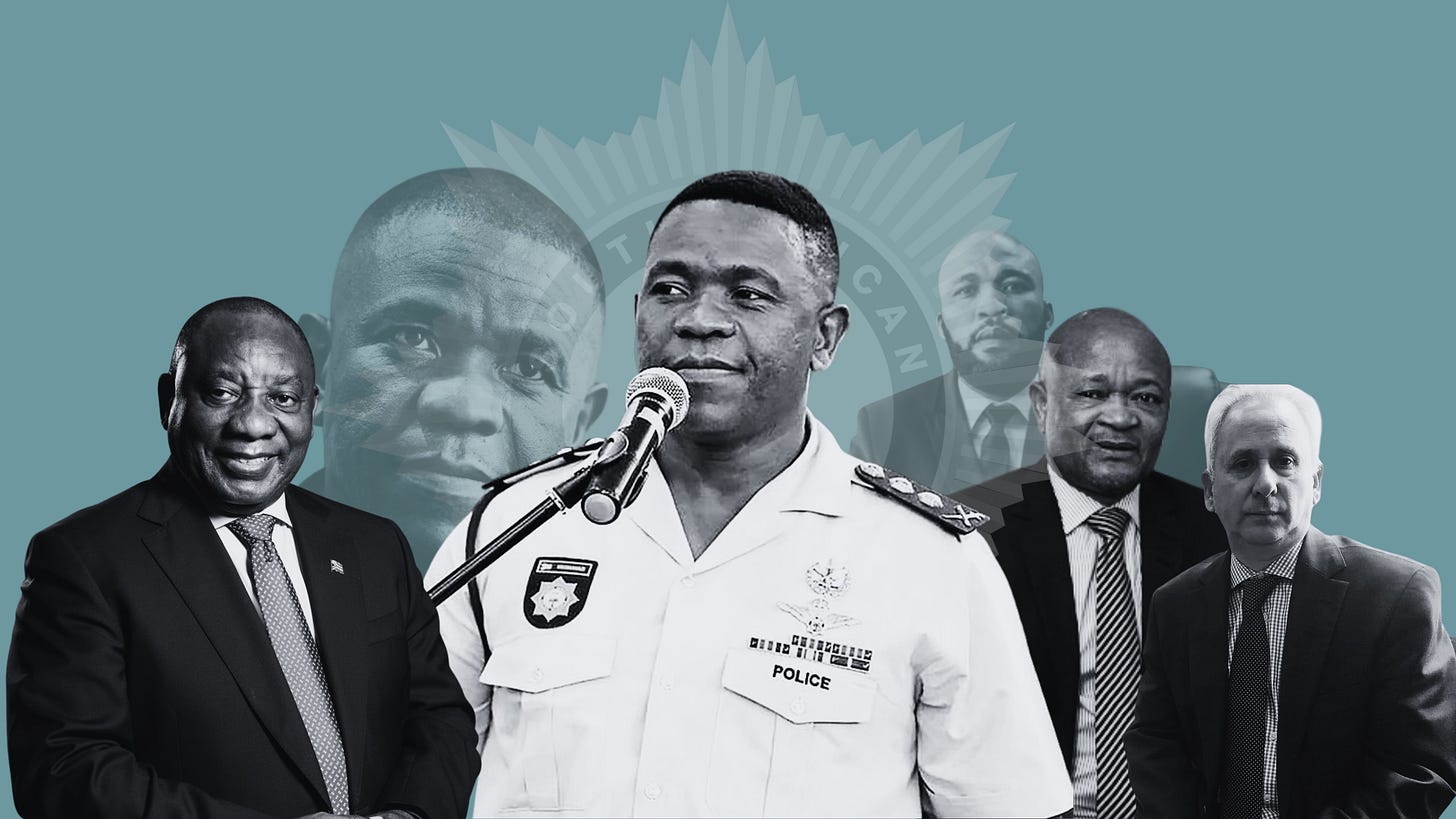The rot inside the South African Police Service
It’s been just over a week since a South African Police Service (SAPS) commissioner made damning allegations against the police. Cyril Ramaphosa responded.

On Sunday 6 July, KwaZulu-Natal police commissioner lieutenant general Nhlanhla Mkhwanazi levied a series of allegations against the sanctity of the SAPS.
The Mkhwanazi’s allegations argued that a high-level criminal syndicate is operating in South Africa which has managed to infiltrate the SAPS, other law-enforcement authorities, prison structures, the judiciary, South Africa’s parliament and the police ministry. He also alleged that a drug cartel from Gauteng is in control of the syndicate.
But the allegations don’t stop there. Mkhwanazi also claimed that South Africa’s police minister Senzo Mchunu — now on special leave — issued a directive to disband the Political Killings Task Team (PKTT) in an effort to shield politically connected members of a criminal syndicate.
These accusations have sent shockwaves throughout South Africa, leading many to question the efficacy of the SAPS at a time when South Africa has been thrown into the global spotlight for its crime.
But Mchunu has denied the allegations.
READ MORE | South Africa after ‘the great tsek’
HOW WE GOT HERE
After the assassination of an ANC activist, Musawenkosi “Qashana” Mchunu, the PKTT was formed in 2018. By 2025, it had investigated more than 600 dockets, arrested 436 suspects, recovered 156 firearms, and accumulated 1800 years in prison for convictions linked to political killings.
Now here’s where the problems begin:
In April 2024, Armand Swart, a Q-Tech employee was gunned down upon entering the company premises. This comes after the company uncovered corruption linked to Transnet and tender processes. It’s important to note that Q-Tech has been a longstanding service provider to Transnet.
The Gauteng Organised Crime Unit requested help to dismantle and investigate a criminal syndicate on 6 December 2024. Nhlanhla Mkhwanazi then sent 10 members of the PKTT, who conducted raids and arrested one suspect in Gauteng — Katiso Molefe.
On the 30th of December 2024, the investigation unmasked a syndicate which involved politicians, law enforcement and lawyers. The syndicate was believed to be controlled by drug cartels and prominent business people.
Earlier recovered ballistics tests run on weapons linked the guns to the murder of Armand Swart.
One day later, on the 31st of December 2024, the South African minister of police Senzo Mchunu ordered the PKTT to be disbanded.
This is where Brown Mogotsi comes in. Mogotsi is a prominent business man in South Africa’s North West. On the 1st of January 2025 he texted a man known as Vusimuzi ‘Cat’ Matlala — another prominent business man — to confirm that the PKTT had been ordered to be disbanded.
The message read:
The task team that came to your house and harassed you have been dissolved; They got the letter on Monday. As we speak, they are bringing all dockets to Sibiya.
A deeper investigation revealed that Matlala was allegedly financially supporting police minister Mchunu and Mogotsi’s political endeavours.
Continuing through January 2025, Matlala sent a proof of payment to Brown Mogotsi, who, on the 14th, told Matlala to finalise his invoices. The next day, Matlala submits a suspicious SAPS invoice. On the 15th, Mogotsi updated the “Minister” — presumed to be Mchunu — about a “funding guy” in Johannesburg with a 3 Billion Rand contract.
Later on the 5th of March 2025, police minister Mchunu downplayed ever knowing Mogotsi in the South African parliament. By the 26th of March, 121 dockets were taken away from the PKTT, on the instruction of the deputy national commissioner lieutenant Gen Shadrack Sibiya.
On the 30th of March, minister Mchunu is caught in an X-space audio, confirming that he does actually know Mogotsi.
On the 13th of May 2025, Matlala’s SAPS contract was cancelled by the national commissioner. The next day Matlala messages Mogotsi with a threat:
Morning, just to let you know that my contract was cancelled yesterday, and i see you've been ignoring me and promising me things that never happened, luckily took screenshots of every conversation just in case something like this might happen, l'm taking all this to media and some to court on Friday when i do the interdict.
That same day (May 14th), Matlala was arrested for the attempted murder of his former lover, Tebogo Thobejane in 2023.
On the 30th of May, the Investigative Directorate Against Corruption (IDAC) requested Matlala’s cellphones from the PKTT.
On the 25th of June 2025, the IDAC arrested the PKTT’s project coordinator.
Now, on the 6th of July 2025, KwaZulu-Natal police commissioner lieutenant general Nhlanhla Mkhwanazi exposes all of this. Mkhwanazi concluded that the attempts to disband the PKTT was because of the team’s work in Gauteng, which uncovered this criminal syndicate.
CYRIL’S RESPONSE
South Africa’s president Cyril Ramaphosa addressed the nation a week after Mkhwanazi’s accusations.
The president said that he has launched a judicial inquiry that will investigate the allegations of the syndicate’s infiltration of South African police agencies.
The response was delayed to Sunday 13 July, as Ramaphosa was in Brazil attending a BRICS summit.
Ramaphosa said that “the commission will investigate allegations relating to the infiltration of law enforcement, intelligence and associated institutions within the criminal justice system by criminal syndicates.”
The commission will also investigate whether any members of the national executive overseeing the justice system were complicit in alleged criminal activity.
THE WAY FORWARD
While South Africa has become synonymous with ineffective commissions of inquiry, — see the Zondo commission, which was supposed to be a 6 month affair that lasted until 2022 — only time will tell if anything will come from this.
Mkhwanazi’s allegations reveal what many South Africans have perhaps been suspecting for many years now that their police are thick as thieves with the very crime they try to prevent.
If South Africa has any hope of rooting out the organised crime and violence that plagues the country, this commission better have some teeth.





